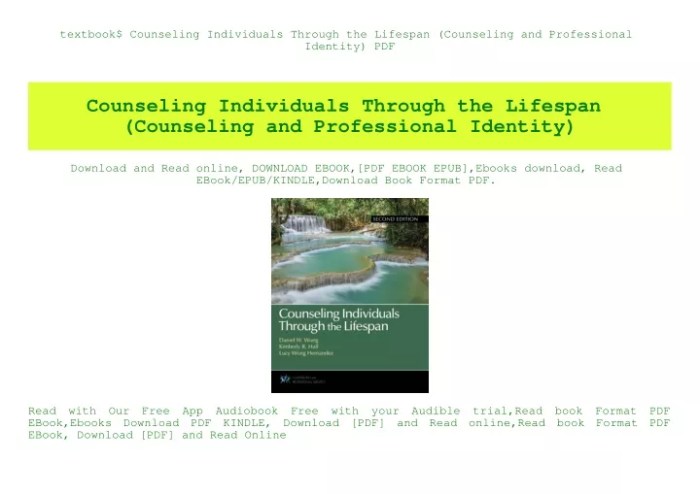Counseling individuals through the lifespan 2nd edition – Counseling Individuals Through the Lifespan, 2nd Edition provides a comprehensive and up-to-date overview of the field of lifespan counseling. This authoritative text explores the theoretical foundations, assessment and diagnosis, treatment planning, and intervention strategies used in lifespan counseling, with a focus on the unique challenges faced by individuals at different stages of life.
The book begins by defining lifespan counseling and discussing its significance. It then provides an overview of the different stages of the lifespan, from infancy to old age. The following chapters explore the major theories used in lifespan counseling, including psychodynamic, cognitive-behavioral, and humanistic approaches.
The book also provides detailed guidance on assessment and diagnosis, treatment planning, and intervention strategies, with a focus on evidence-based practices. The final chapters address special populations in lifespan counseling, such as children, adolescents, adults, and older adults, and discuss the ethical and legal issues that arise in this field.
Introduction: Counseling Individuals Through The Lifespan 2nd Edition

Lifespan counseling is a specialized field of counseling that focuses on providing support and guidance to individuals across the entire lifespan, from infancy to old age. It recognizes that human development is a continuous process, and that individuals face unique challenges and opportunities at each stage of life.
Lifespan counseling seeks to promote optimal well-being and personal growth throughout the lifespan.
Lifespan counseling is significant because it provides a comprehensive and holistic approach to addressing the needs of individuals. By considering the individual’s developmental stage, personal history, and current circumstances, lifespan counselors can tailor interventions to meet the specific needs of each client.
This approach can lead to more effective and meaningful outcomes for clients.
The lifespan can be divided into several distinct stages, each with its own unique developmental tasks and challenges. These stages include infancy, early childhood, middle childhood, adolescence, young adulthood, middle adulthood, and old age. Lifespan counselors must be familiar with the developmental characteristics of each stage in order to provide effective counseling services.
Theoretical Foundations of Lifespan Counseling

Lifespan counseling draws upon a variety of theoretical frameworks to guide its practice. These theories provide a lens through which counselors can understand human development and behavior, and they inform the interventions that are used to promote client growth and well-being.
Major Theories Used in Lifespan Counseling, Counseling individuals through the lifespan 2nd edition
- Attachment theory
- Cognitive-behavioral theory
- Humanistic theory
- Psychodynamic theory
- Social learning theory
Each of these theories has its own unique strengths and limitations, and lifespan counselors must be able to select the most appropriate theory for each individual client. For example, attachment theory can be particularly useful for understanding the development of relationships in infancy and early childhood, while cognitive-behavioral theory can be effective for addressing anxiety and depression in adolescence and adulthood.
Assessment and Diagnosis in Lifespan Counseling

Assessment is an essential component of lifespan counseling. It involves gathering information about the client’s developmental history, current functioning, and presenting problems. This information can be used to make a diagnosis, which is a formal statement about the client’s mental health condition.
There are a variety of assessment tools that can be used in lifespan counseling, including interviews, questionnaires, and psychological tests. The choice of assessment tools will depend on the client’s age, developmental stage, and presenting problems.
Ethical Considerations in Assessment and Diagnosis
- Confidentiality
- Informed consent
- Competence
- Objectivity
Lifespan counselors must be aware of the ethical considerations involved in assessment and diagnosis. This includes obtaining informed consent from the client, maintaining confidentiality, and avoiding bias or discrimination in the assessment process.
FAQ Compilation
What is lifespan counseling?
Lifespan counseling is a type of counseling that focuses on the unique challenges and opportunities that individuals face at different stages of life. Lifespan counselors work with individuals from infancy to old age, helping them to navigate the challenges of each stage and achieve their full potential.
What are the benefits of lifespan counseling?
Lifespan counseling can help individuals to improve their mental health, relationships, and overall well-being. It can also help individuals to cope with difficult life events, such as grief, loss, and trauma.
Who can benefit from lifespan counseling?
Lifespan counseling can benefit individuals of all ages, from children to older adults. It is particularly helpful for individuals who are experiencing challenges related to their age or stage of life.